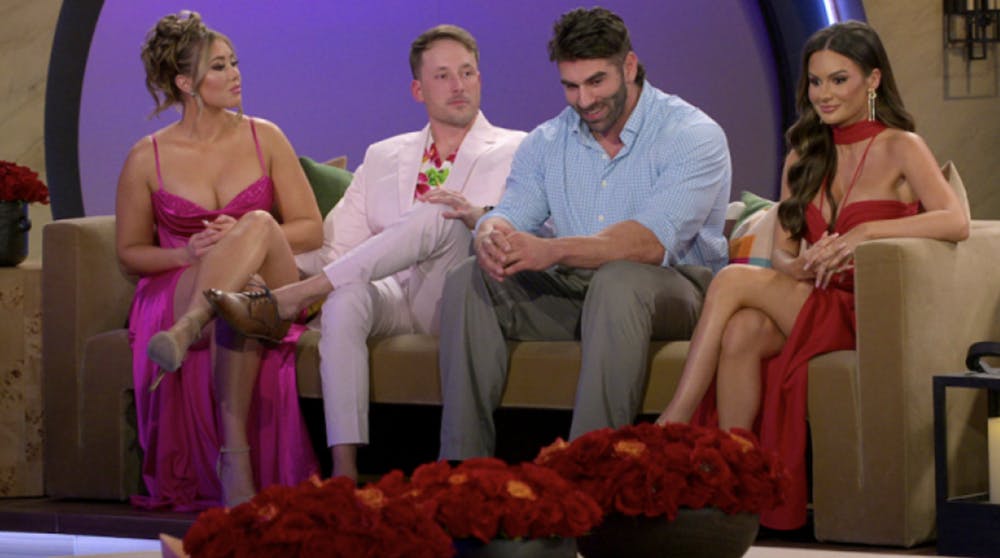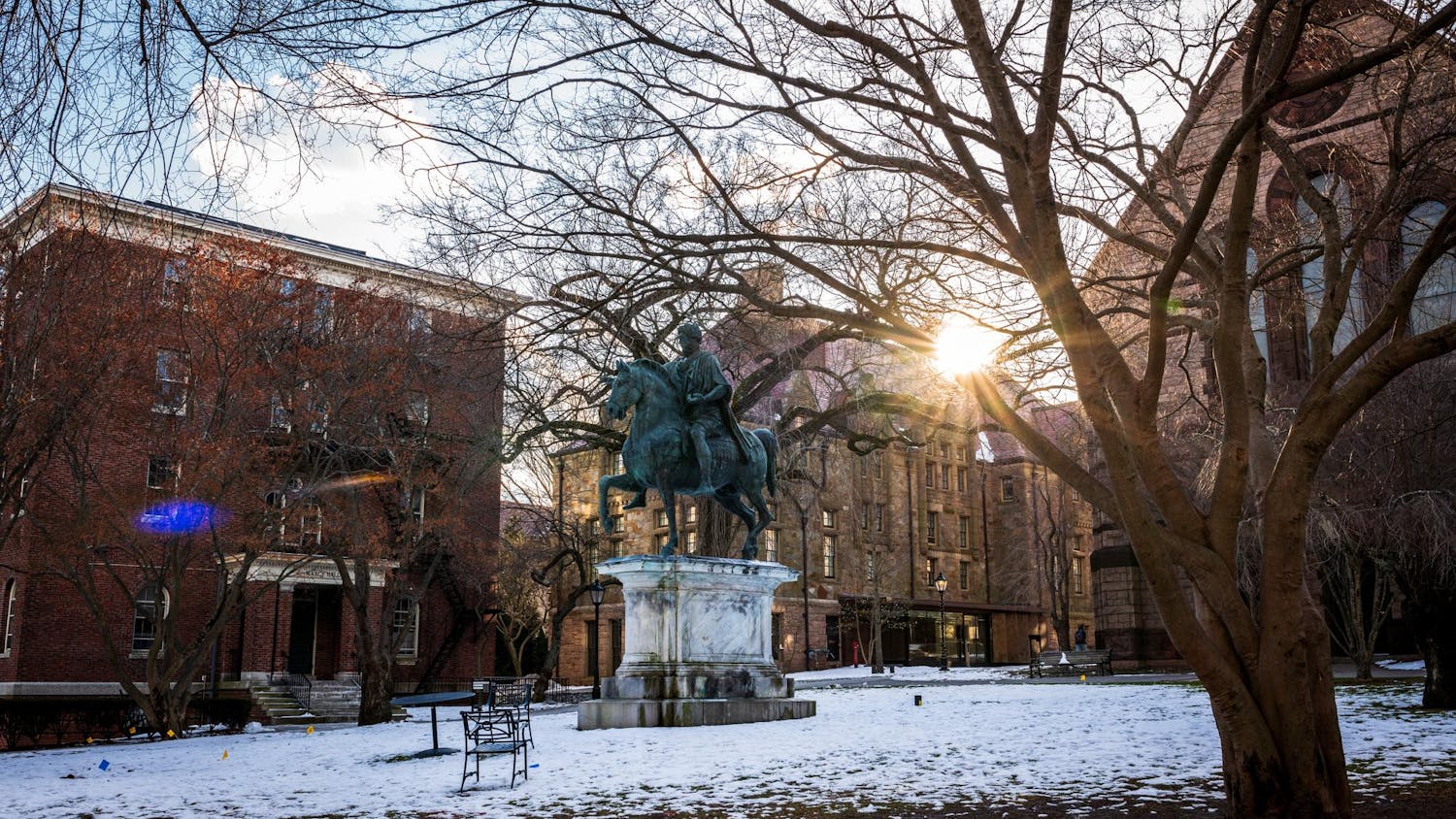Netflix’s “Love is Blind” has always been crazy.
The show is notorious for its outlandish premise, where participants date, “fall in love” and get engaged all without seeing one another. The couples only finally meet four weeks before their weddings. The show’s sixth season, which premiered on Valentine’s Day, is a testament to its dysfunction.
As a long-time watcher, intimately familiar with the show’s dismal success rate, this season’s chaos didn’t faze me. But I finished the show baffled by the cast and showrunners’ staunch insistence that the “Love is Blind” experiment pursues a nobler, purer love than dating in the outside world.
At the start of each season, contestants spend 10 days in “pods,” small adjacent rooms where couples can talk through a wall without seeing one another. The only way couples can meet face-to-face is by getting engaged, after which they spend an idyllic week in the Dominican Republic before returning home.
In the pods, contestants are sequestered by gender, stripped of their devices and plied with fresh fruit and champagne as they go on date after date. Love triangles form and wither. Connections spark to life over shared interests, past trauma, guiding values, pure good vibes, more trauma, sexual chemistry and just a sprinkle more trauma. In a matter of days, they’re professing their love and lifelong commitments to one another.
This season, out of 30 contestants, five couples got engaged and made it out of the pods. Two made it to the altar, but only one pair entered into holy matrimony: Johnny and Amy, a sweet and wholesome couple who remain a glimmering beacon of hope amid a wreckage of broken hearts and fizzled-out sparks.
The self-described “suave” and egotistical Clay turns down Amber Desiree at the altar, fearing he might be unfaithful just like his father was. Jeramey and Laura, who built their relationship off of cutting banter, call it quits over Jeramey’s decision to stay up until 5 a.m. talking to Sarah Ann, a past connection from the pods. Brittany and Kenneth’s relationship dies a quiet death over a kitchen counter one morning when they decide they just don’t work. Chelsea and Jimmy battle two love triangles, blowout fights and deep-set insecurities before falling at the final hurdle when Jimmy ends their relationship the night before their wedding.
Not a particularly encouraging picture. The experiment, it seems, has overwhelmingly failed.
Of the 27 engaged couples to come out of the show’s six seasons, nine are still married today. But as the show cuts away from a deliriously joyful montage of Amy and Johnny’s wedding to a shot of Clay sitting alone in a room, gaze trained on the floor, I can’t shake the feeling that those nine couples succeeded not because of, but despite the show’s machinations.
The show’s reunion episode, which takes place a year after the original filming, was released Wednesday night. Co-hosts Nick and Vanessa Lachey preside smugly over the most recent season’s cast as they sit crammed together on couches, discomfort palpable in the air. The cast rehashes drama from the show as the Lacheys pull up exclusive footage, cattily prompt arguments and sit back to watch as contestants get into screaming matches.
It’s a stunning contrast to the showrunners’ lofty declarations. At its core, “Love is Blind” implies that the intense connections forged in the pods are the purest form of love. The first weeks whirl by in a tornado of satiny maxi dresses, white countertops, freshly curled hair, golden goblets and tropical bliss. Then contestants are turned loose and told to keep that “love” intact among social and financial realities. They fight tooth and nail to make it through four weeks together, and if they get married they’ve won at love.
Yes, the reality television industry thrives off of the gamification of romance. But “Love is Blind” has consistently promised to be something more, something better. Unlike its sister shows, “Love is Blind” has never been unapologetically trashy. Instead, it repeatedly sets its contestants up to feel like they’ve failed a chance at true love.
In addition to the season six couples, the Lacheys invite Trevor, who captured the hearts of viewers worldwide with his golden-retriever personality, to the reunion. After the show first aired, an ex-girlfriend of his leaked texts proving that they were in a relationship when he decided to go on the show to look for something else. The Lacheys project those texts at the reunion, asking Trevor if he came on the show just to gain fame.
“I … I don’t know what you want me to say,” he says. “Can I just, like, leave right now?”
“We do not want people to come here motivated by fame. That’s not what this is about,” Nick Lachey says. “It’s not fair to the people right here … who’ve invested genuinely in what this thing is truly, truly all about. It’s just wrong. It really is.” He then tells Trevor to leave.
For the first time in the show’s history, former contestants, both successful married couples and crowd favorites that didn’t make it to “I do,” were invited. It’s an obvious attempt to reclaim a shred of legitimacy and bolster the audience’s faith in the “experiment.”
The Lacheys go on to reveal that some of the past contestants they’ve invited to the reunion are soon going to appear on “Perfect Match,” another Netflix dating show. Everyone cheers.
The show closes out on a shot of all the contestants, past and present, clapping and standing up with half-smiles on their faces. Nothing was resolved. Old heartbreaks were stirred up, reality stars were born. Back to the real world again.

Anisha Kumar was the senior editor of community and standards of The Herald's 135th editorial board. She previously served as a section editor covering University Hall and international student life. She is a junior from Menlo Park, California concentrating in English and Political Science who loves speed-crosswording and rewatching sitcoms.





